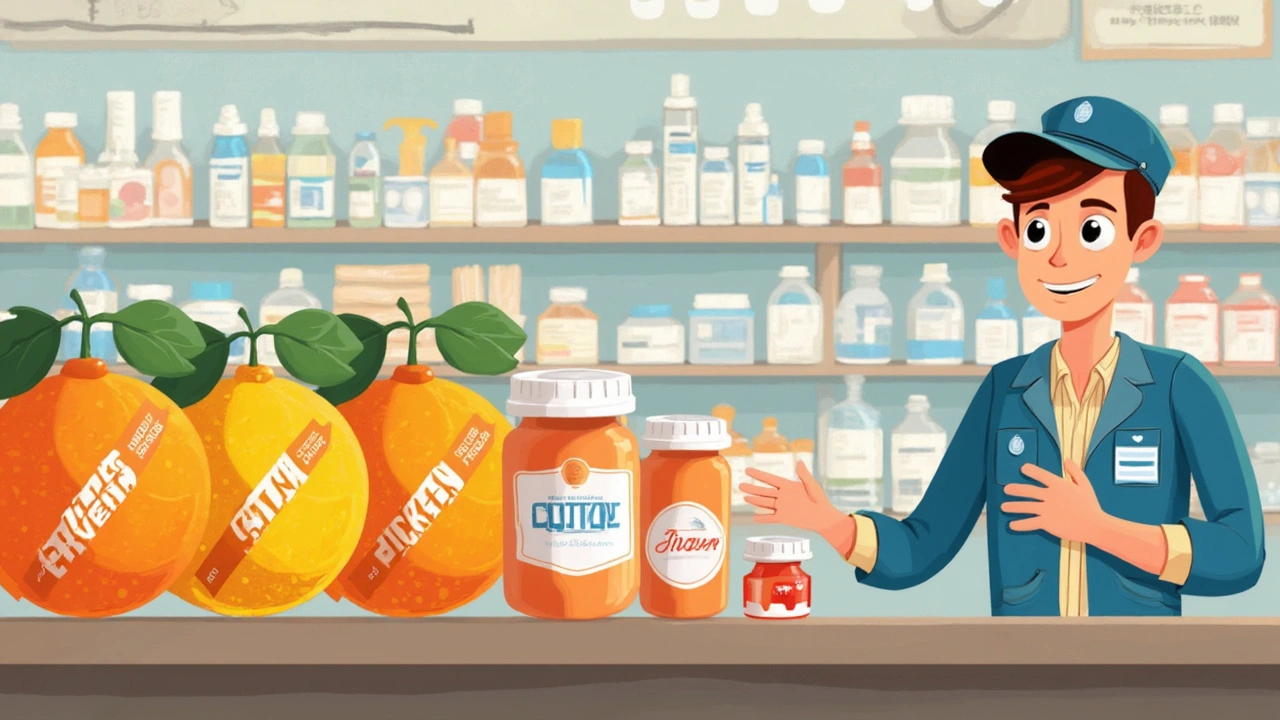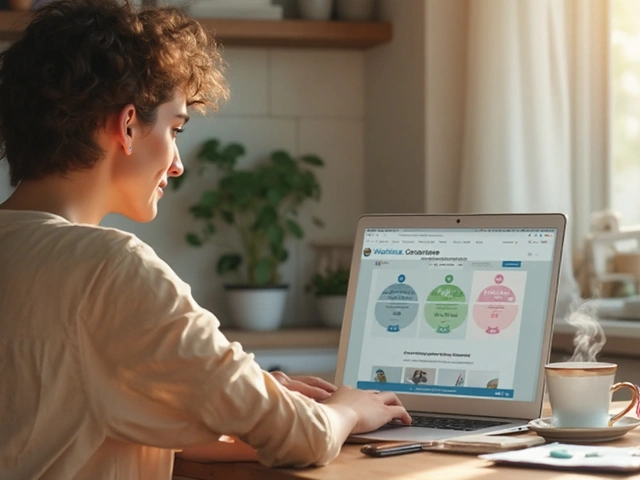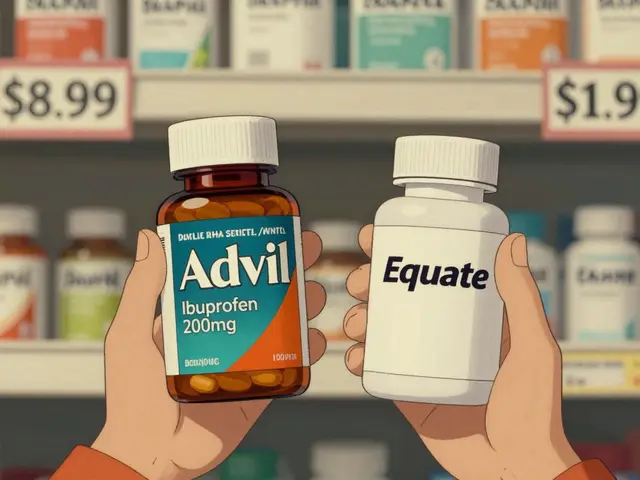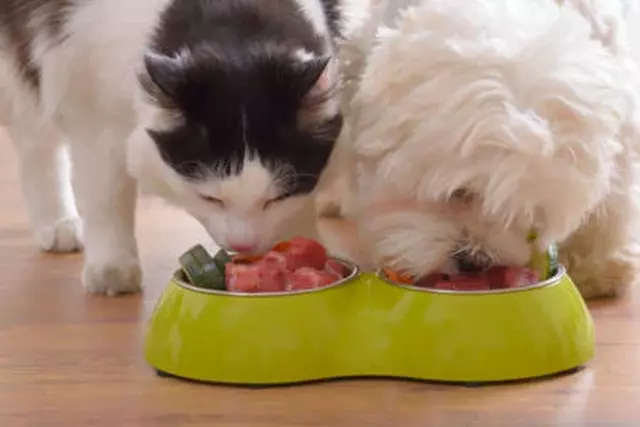Citrus Drug Interactions: Hidden Risks Beyond Grapefruit Explained
If you think citrus and medicine only clash when grapefruit gets involved, you're in for a surprise. Turns out, the humble Seville orange, that tangy pomelo, and even sweet tangelos can provoke trouble with your prescriptions—sometimes as much or more than their better-known cousin. Let’s stir this citrus bowl and see what else could be mingling with your meds right now—even from hiding spots like salad dressings or that marmalade on your morning toast.
The Science Behind Citrus-Drug Interactions
Everyone’s heard how grapefruit juice can ruin your statin game. But most people don’t realize why. It’s all about an enzyme called CYP3A4. Bear with me: this enzyme is a key bouncer in your gut wall, controlling which drugs make it from your intestines into your blood. Grapefruit chemicals—furanocoumarins—block this enzyme, leaving the doors open for certain meds to flood your system. Here’s the kicker: Seville oranges, pomelos, and tangelos have their own twists on these mischief-makers.
Seville oranges—yep, those ones that make marmalade sour—contain practically the same furanocoumarins as grapefruit. Pomelo, often the size of a small football and native to Southeast Asia, can pack enough enzyme-blockers to cause dangerous spikes in some medications. Tangelos, the snappy cross between a tangerine and a grapefruit or pomelo, may also push CYP3A4 around, though their effect isn’t always as strong. The interaction is real enough that some hospitals quietly urge their cardiac patients to skip all these fruits, not just grapefruit.
To make it practical, imagine you’re on a calcium channel blocker for blood pressure. Whether you wash it down with a Seville orange juice or a fresh pomelo, you risk higher drug concentrations than your doctor intended. According to a Canadian drug safety paper from last year, patients who unknowingly combined citrus and certain statins had a 30% higher chance of experiencing severe muscle pain or liver enzyme spikes. And we’re not just talking theory—this stuff shows up in ERs, especially in the over-50 club.
It’s not just the “how” that matters but the “when.” Certain compounds hang around in your body for a good 24 hours after eating, so a breakfast pomelo could trip up your bedtime pill. That delayed-action trap makes these interactions unpredictable. The problem’s so important that the FDA updated some statin labels to warn about citrus across the whole fruit basket, not only grapefruit. (Curious about the dangers? Here’s a deep dive on atorvastatin and grapefruit—definitely worth a read if statins are in your medicine cabinet.)

Which Medications React and How They’re Affected
Let’s get specific. While the world talks about statins, that’s only the tip of the orange. Blood pressure meds (like felodipine and nifedipine), some antihistamines, certain anti-anxiety drugs, specific antiarrhythmics, and even immune suppressants (hello, cyclosporine) can all get messed up by citrus. Basically, if your med label says “avoid grapefruit,” don’t just substitute in a Seville orange—or, if you’re traveling in Asia, a pomelo. Here’s a quick look at real-world numbers and what could go sideways:
| Fruit | Furanocoumarin Content | Effect on CYP3A4 | Major Drug Classes Affected |
|---|---|---|---|
| Grapefruit | High | Strong Inhibitor | Statins, CCBs, Immunosuppressants |
| Seville Orange | Medium-High | Significant Inhibitor | Statins, CCBs, Others |
| Pomelo | Medium | Moderate Inhibitor | CCBs, Some Anticancer Drugs |
| Tangelo | Variable | Mild-Moderate | CCBs, Occasional Statins |
Here’s the bottom line: the more a fruit blocks CYP3A4, the more it boosts the level of certain meds. For example, just 200 ml of Seville orange juice can double your blood level of felodipine, a calcium channel blocker. That difference might send your blood pressure plummeting way too low. A study out of Florida’s citrus belt clocked a 75% increase in simvastatin blood level from one big glass of pomelo juice—showing it’s not just theoretical, it’s hitting real patients. I’ve even heard from an Austin pharmacist who had to switch patients off a med entirely because of their citrus habit.
Here’s a tip that surprises most people: labels may only warn about grapefruit, leaving folks to assume other citrus is safe. But if a fruit tastes sharp, bitter, or “grapefruit-y,” treat it with caution. Handmade marmalade can also be risky—the cooking process doesn’t always destroy those enzyme-busting compounds. Sometimes, even citrus zest in recipes packs enough of a punch. If you’re a fan of wild cocktails, double check what fruit juices you’re using as mixers, since those can land you in hot water fast, especially with heart meds.
Bizarre fact: some hospitals provide lists of what patients should avoid, and pomelo often sneaks onto those lists in Asia and Europe. It’s not paranoia—people who ate pomelo segments for diabetes control found their blood sugar med (repaglinide) shot up by 30-60%. While citrus is loaded with vitamin C, it’s not worth the risk if it means messing up your drug metabolism.

What to Do: Navigating Citrus and Medication Safely
Alright, so you don’t have to live in fear of every fruit bowl at your local grocery store, but you do need to pay attention. If a drug’s label says “avoid grapefruit,” that’s your first hint. I’d stretch that to mean “avoid any grapefruit relative” unless your doc says otherwise. Here’s what you can actually do—without needing a pharmacy degree:
- Ask clearly: "Can I eat oranges?" Actually specify the type. Doctors usually think of navel or Valencia oranges (which are safe), but if you mention Seville, pomelo, or tangelo, they may need to double check.
- Stay aware of hidden sources. Seville oranges show up in marmalade, dressings, and gourmet jams. So check the ingredients if you’re a fan of anything “bitter orange.”
- Don’t trust every fruit blend. Some juices get “tartness” from mixing in Seville or pomelo, labeled only as “citrus juice.”
- If you got a new prescription, ask your pharmacist: “Do I need to avoid any citrus with this?” And don’t worry about looking silly—I promise the question is smarter than ignoring it.
- Track timing. Ensuring 24 hours between citrus and your meds may lower risk, but some enzyme blocking hangs around, so don’t bank on it fixing every problem.
- If you like recipes with zest or juice, use navel or Valencia oranges instead, or just skip the zest altogether.
- If you enjoy international cuisines, double check how citrus appears. Some Southeast Asian or Mediterranean recipes feature pomelo or bitter orange as key elements.
- Know your symptoms. Unexpected muscle pains, dizziness, unusually low blood pressure, or new side effects after eating citrus could be a drug interaction—call your doc before you quit your meds or switch fruits on your own.
- Don't self-diagnose. I've seen folks in Austin blame everything on allergies when it was really a citrus-drug issue.
If you accidentally eat something risky, don’t panic. Just let your healthcare provider know as soon as possible so they can decide if you need blood tests or observation, especially if you’re on a narrow therapeutic index drug (where the window between safe and risky doses is tiny).
One quirk: pets like my hedgehog Theodore don’t have this problem, but some animals are extra sensitive to certain citrus oils. If you’re using citrus around pets, keep the leftovers out of their reach—hedgehogs and cats, in particular, process drugs even more unpredictably than people.
So, next time you see a jar of fancy marmalade at a farmer’s market or get tempted by the exotic look of a pomelo, think twice if you’re on certain meds. When in doubt, keep it simple and keep your doc in the loop. That way, you get the sweet, tangy life without any nasty surprises in your prescription routine.







11 Comments
Michelle Wigdorovitz
July 18, 2025 at 05:04
Wow, this article totally opened my eyes! I always thought it was just grapefruit you had to avoid if you were on meds, but Seville oranges and pomelos too? That's wild!
I'm wondering, though, does it affect all types of meds or only specific classes? Because I know some people drink orange juice with their pills all the time and don't have any issues.
Also, the article mentions statins, but I’m curious about other meds too. Maybe anyone here has experienced odd reactions related to citrus fruits?
This definitely changes how I see my morning routine. Would love some practical advice on safe fruit consumption while medicated.
Arianne Gatchalian
July 21, 2025 at 20:24
I really appreciate this guide! It’s surprising how many fruits can interact with meds beyond just the notorious grapefruit.
From what I understand, the compounds in these citrus fruits inhibit an enzyme called CYP3A4 in the intestines, which alters drug metabolism. That can lead to either toxic buildup or reduced efficacy depending on the medicine.
So it's definitely a good idea to check with your doctor or pharmacist about your specific meds and whether certain fruits might cause issues.
Does anyone know if these interactions are immediate or if they build up over time? Always trying to parse the timing aspect.
Andy V
July 26, 2025 at 18:18
Okay, let me just say something here — like seriously, this is basic pharmacology that shouldn’t be news to anyone taking meds.
Everyone always freaks out about grapefruit like it’s some mysterious forbidden fruit in the pharmacy world. But yeah, plenty of other citrus fruits have the same effects, and it’s on product labels for crying out loud.
Still, people don’t read or ask questions. You wanna stay safe? Talk to your doctor instead of panicking over some orange juice.
Also, the article saying 'seriously mess with medications' is a bit over the top if you ask me. The real concern is which medicines, in what doses, and with how much fruit intake. Not everything is doom and gloom.
Kim M
July 29, 2025 at 21:04
Ugh, can we talk about how pharmaceuticals probably know this and don’t want us to know all the details? 🙄 This is just another way the system controls us by keeping info half-hidden.
I bet big pharma suppresses more natural remedies like these fruits because they threaten their profits. Why else would we only obsess about grapefruit when heck, so many citrus fruits mess with meds?
Honestly, I’m suspicious about the extent of these interactions and whether they’re playing it safe to keep us dependent on meds.
Anyone else think there’s more to this story? 🍊💊💥
Richard Gerhart
July 31, 2025 at 18:31
Hey all, just chiming in as someone who works in pharmacy. The concerns about citrus fruits, especially grapefruit, and drug interactions are well documented.
It's good to remember though that not every patient will have a reaction, and often the effect depends on the dose of the fruit, the type of medication, and individual patient metabolism.
I always advise patients to be consistent with their diet and medications and discuss any changes with their healthcare provider. This includes beverages like orange juice, which can also affect drug absorption.
Knowledge is power but don't let articles scare you unnecessarily. Ask questions and stay informed!
Aly Neumeister
August 2, 2025 at 10:11
Really, some of you are so @#$%! paranoid. Like chill! 🍊 Seriously, if your doctor doesn’t warn you about possible interactions, then why lose sleep over tangelos or pomelos?
I mean, yeah, it’s good to be informed but some folks act like they’re going to die from a sip of orange juice.
Just don’t be reckless, take your meds properly, and don’t binge fruits at weird times and you’ll be fine.
Plus, health is all about balance not fearing every little thing we eat.
Nilesh Barandwal
August 3, 2025 at 13:04
This discussion makes me reflect on how little we often understand about the foods we consume, especially in relation to medicine.
The biochemical interactions are quite complex, and as mentioned, CYP3A4 inhibition can cause significant effects, but the threshold varies widely.
It would be enlightening to have clearer, standardized guidelines on which citrus fruits affect which medicines and in what quantities, rather than vague warnings.
It’s an ongoing dance between nutrition, pharmacology, and individual patient factors, after all.
Martin Gilmore
August 5, 2025 at 10:24
Seriously? More alarmist garbage about fruit-drug interactions?
People want to whip themselves into a frenzy over a glass of juice, acting like the world’s ending every time they consume an orange or similar.
Enough is enough. If you’re on meds and worried, do your homework or talk to a doctor, but quit with the hysteria.
Honestly, articles like this fuel unnecessary panic, and it’s irresponsible.
Is it really that hard to be rational about simple things?
Elise Smit
August 7, 2025 at 13:08
Thank you, everyone, for the insightful comments above. I just want to add from my perspective as a healthcare coach that being aware of such food-drug interactions can greatly help patients avoid adverse effects.
While the media sometimes sensationalizes risks, it’s crucial to understand that these interactions can have serious consequences in sensitivity cases.
Patients should maintain open communication with their healthcare providers and report any unusual symptoms after consuming certain fruits when on medication.
Education and patience go a long way in managing these hidden risks.
jana caylor
August 10, 2025 at 03:58
I’m with the cautious camp here. My mom had unexpected side effects from her cholesterol meds, and we later found out she’d been drinking tons of Seville orange juice every morning without knowing it could interfere.
It’s easy to dismiss these warnings, but I think the devil’s in the details.
Also, for those asking about timing, from what I’ve read, it’s usually the juice consumed within 24 hours before or after the meds that matters most.
Small changes in diet like this could be lifesaving for some people!
joni darmawan
August 17, 2025 at 05:04
Philosophically speaking, these drug interactions remind us of the delicate interplay between nature and modern science.
These citrus fruits, natural products of the earth, can profoundly affect artificial compounds designed within labs.
It highlights our ongoing journey of understanding our bodies and the substances we consume.
Perhaps the key is mindful consumption and deeper respect for how interconnected our health truly is.